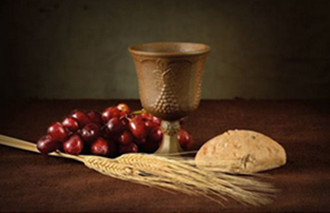When we – as the people of God - come together to share the Eucharist, we proclaim that we wait in joyful hope for the coming of the kingdom. It is this vision of faith that gives us the ability to celebrate and affirm life, even in the face of diminishment and difficulty. It does not allow us to be indifferent to suffering and injustice. It challenges us and forces us be involved with the pain of the world, but not absorbed or overwhelmed by it... because our hope is always rooted in the goodness and faithfulness of God.
 For centuries, the Eucharist was made more and more remote - locked in the Tabernacle, barricaded behind altar railings, and forbidden to so many of the faithful because of legal impediments. Rigid laws of fasting kept many from receiving; consciences over laden with guilt kept good people away from the Eucharist when they were most in need of its healing and comfort.
For centuries, the Eucharist was made more and more remote - locked in the Tabernacle, barricaded behind altar railings, and forbidden to so many of the faithful because of legal impediments. Rigid laws of fasting kept many from receiving; consciences over laden with guilt kept good people away from the Eucharist when they were most in need of its healing and comfort.
However, all the words of Jesus concerning the Eucharist speak a totally different language. He offers His Body as the Bread of Life; He says strongly: " If you do not eat the flesh of the Son of Man and drink His blood, you have no life in you." And He clearly intended that this great Gift should be seen as the source of reconciliation and unity in His Church.
This is not a new attitude; but it certainly reflects the urgent invitation of Jesus Himself to all of us - not only to RECEIVE His Body and Blood, but also to BECOME His Body and Blood for others.
The Eucharist is a gift, not just to be adored and reverenced, but also to be consumed, digested, and lived by every Christian. What were once the simple gifts of bread and wine truly become the Body and Blood of our Savior - the new covenant between God and mankind. What were once ordinary people now become the gift of Jesus to others.
This is because the Eucharist is not simply a private gift. It is a communal gift. When the priest holds up the consecrated Host and the cup of Wine and says, "This is My Body… this is My Blood ", he is also affirming to us, "You Are My Body... You Are My Blood!" Jesus gives us His Body and Blood so that He might live in us and so that we then, might become life for the world.
For the past several months most of us have faced the reality of not being able to celebrate the Eucharist “up close and personal.” For some, the unavailability of the Eucharist has long been a sad reality.
Absence may make the heart grow fonder, but it certainly can open our eyes to see how easy it is to take the Eucharist for granted. Perhaps we had allowed our participation at Mass to become old, routine, or boring. Simple things – like shaking hands or embracing a friend or coming together as a whole community - now stand out in bright relief as we slowly and cautiously begin to re-open our churches to public gatherings.
Our understanding of Eucharist means nothing if it isn’t teaching each of us new ways of reaching out and touching the Lord, especially when everything in our current day-to-day experience is telling us to keep distant from one another.
The good thing that might result from this is that we might begin to see the new ways in which the Lord is coming toward us, as we seek new ways to come close to each other again - maybe for the first time.





